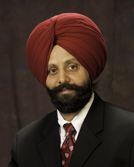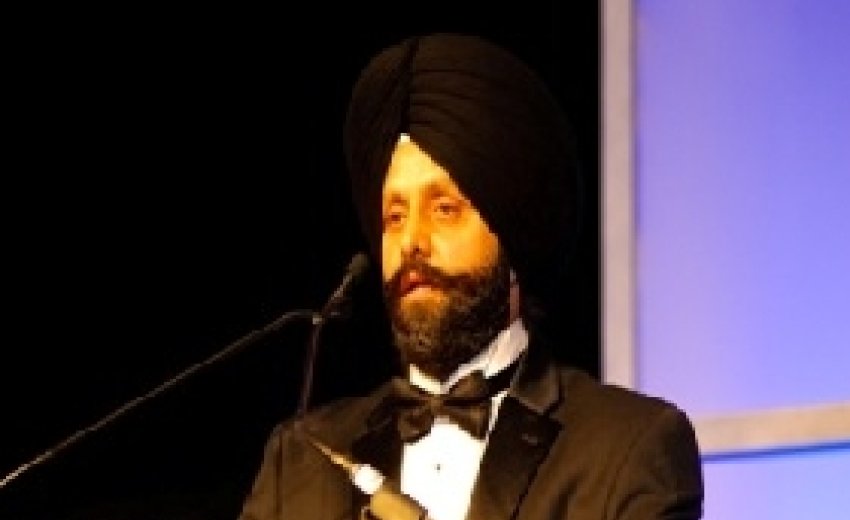Brother of slain Sikh in Phoenix area saw love conquer tragedy
 Sept. 6, 2011: This summer, some teenagers pulled up at a red light next to my gas station in Phoenix. They saw me, and one of them yelled, "Go back to your country!"
Sept. 6, 2011: This summer, some teenagers pulled up at a red light next to my gas station in Phoenix. They saw me, and one of them yelled, "Go back to your country!"
What can you do? Such people kind of demolish the beauty of this nation. They don't realize that this is a place of immigrants.
I am from Punjab, in India. My family has markets and farms there and a dairy where I milked water buffalos as a boy.
We are members of the Sikh religion, so each of us wears a turban, a long cloth wrapped around the head, as a sign of faith, heritage and identity. We are not Arabs or part of the Muslim faith, but some people who know nothing about Sikhism make that mistake.
Sikhs are a minority in India, less than 2 percent of the populace, and there has been persecution since the first guru more than 500 years ago. One day in 1984, armed mobs killed thousands of Sikhs.
Afterward, members of my family began moving to the United States to escape the danger and discrimination.
In school, I had learned good things about America - freedom and culture and that everybody is open-minded - so I wanted to come here. I was 18 when I arrived in Los Angeles to work at a 7-Eleven store. I was not a devout Sikh at the time, so I did not wear a turban, but I talked differently. Still, I never had even a 1 percent feeling of discrimination or any threats.
It was the same when I moved to Phoenix in 1989 to open a restaurant with my brother Harjit. Today, I have an extended family here, maybe 100 nieces and cousins and friends from Punjab.
In 1992, I visited India for an arranged marriage, which is our custom. I met my wife a few days before the wedding, and now, we have three children. I became more religious after marriage - it happens, yes? - so I always wear the turban.
On Sept. 11, not long after planes crashed into the towers, the TV began showing pictures of Osama bin Laden wearing a turban. Immediately, Harjit had a feeling: Most Americans do not understand who we are, and they will think a turban means terrorism.
My brother Balbir owned a gasoline station in Mesa, and I had mine in Phoenix. He called me and said, "You don't go to work today. It is not safe." I asked, "Where are you?" And he said, "I'm at work, Rana, but I'm in a very nice neighborhood. You are not."
A few days later, Balbir and I went shopping in Phoenix. We had a very bad experience, people yelling at us. We went to the Sikh temple and told the secretary we were afraid for our community. We decided to have a news conference in a few days to explain who we are and why we wear the turban and to say we are not part of the terrorists.
The next morning, Balbir called me and said, "I can't find any store in the East Valley that still has American flags. Can you buy one in Phoenix so I can put it at my store?"
Those were the last words I spoke with my brother.
That afternoon, an employee called and said there was a shooting. I thought it must be a robbery. I closed my store and went home to my family.
The phone rang, and I learned that Balbir was dead. He was talking to landscapers about putting in some plants at his gas station when a man came and shot him.
We went there, and I saw his body where they were going to put flowers and trees. It was a most horrible moment. There was no robbery. My brother was killed because someone thought he was Arab, because of a mistake about a turban.
Rick Romley, the county attorney, was there. I knew him as a customer in my restaurant. He looked at me and said, "Rana, I'm going to get whoever did this."
My brother was killed over hate, but there was also much good. Two hundred people came to the gas station that night with candles. I met a little girl, and she was crying. She couldn't pronounce Balbir's name, so she said, "Bill gave me candy whenever I came here with my mother."
Some people came to me and said, "Why don't you guys take off your turbans so you'll be safe?" I told them, "We can't. If we take them off, that says we are afraid of people who do these things, and they are encouraged. The turban is my constitutional right. In the history of Sikhs, we say who we are by wearing it. And, if we take it off, we deny who we are."
We left India to escape persecution and death, only to find it here. But the difference is justice. Here, they arrest the person who killed a Sikh. In India, there is still no justice for thousands who were murdered before I left. We have equal rights in America even though we are a minority, and that makes me proud.
Also, we received so much love from the community, it made me strong. There was a memorial service for Balbir at the Phoenix Convention Center, and 3,000 people came. I remember even my 5-year-old son went to the microphone and said, "I miss my uncle a lot." It was an amazing moment.
I believe that each time something happens, there is some reason. After Balbir died, we found a diary open on his bed. The last words, written in Punjabi, were to God: "You make my life wonderful. I'm so blessed. And I am ready to do whatever you want of me."
Afterward, I made a promise to myself: I will do as much in my life as I can to educate people so it can never happen again, this kind of crime, because of a different color or talk or clothing.
At first, we were going to sell the gas station. But my parents said, "No, our son built this place, and he laid down his life." So, Balbir's son works there, and we built a very nice memorial.
Ten years have passed. There are still dirty looks and mean comments. There's a lot of ignorance. It makes you sad to see these racist people.
Frank Roque, the man who killed my brother, was one of them. He was sentenced to death at first, but now, he's in prison for life without parole. I didn't want him killed. This way, he meets a lot of people and tells them what happened, and they will know about the Sikhs.
I miss my brother almost every day. It's a big thing. But I never wanted to go back to India, never lost my belief in America. A documentary film was made about me. They called it, "A Dream in Doubt." I don't know why they used that title. My dream is not in doubt. It's confirmed. I'm going to live here my whole life, and I already have the dream.
